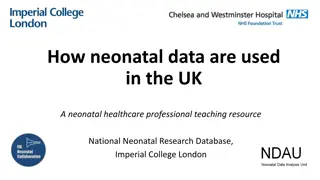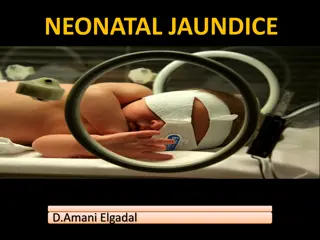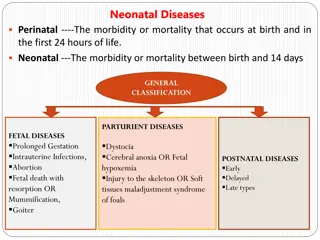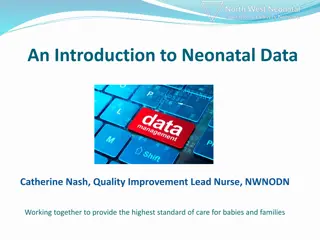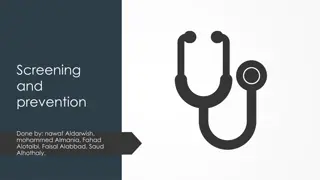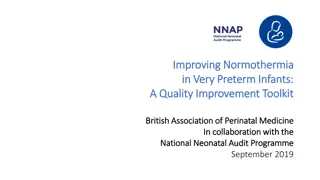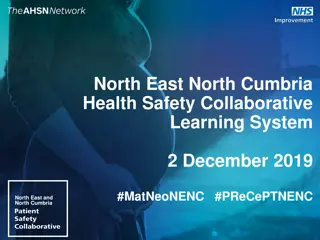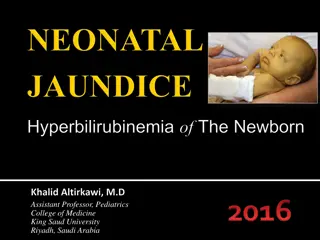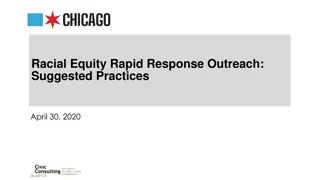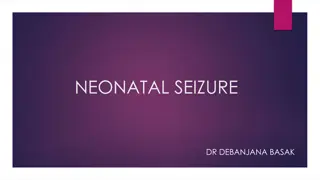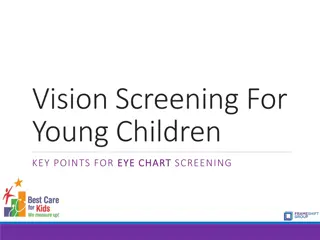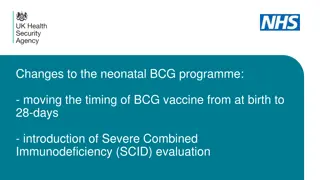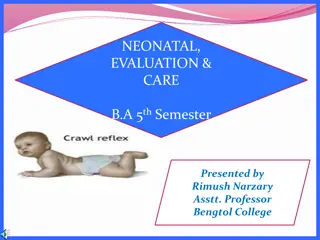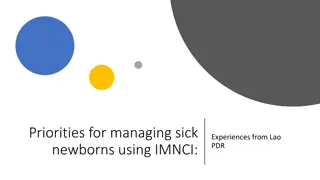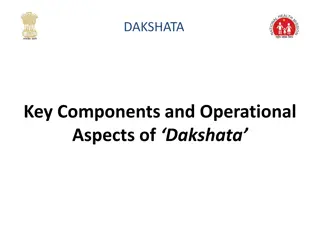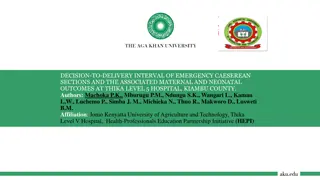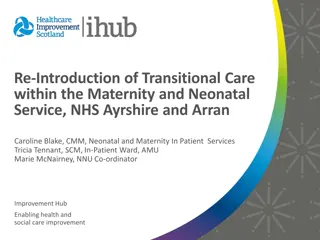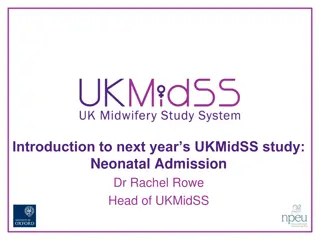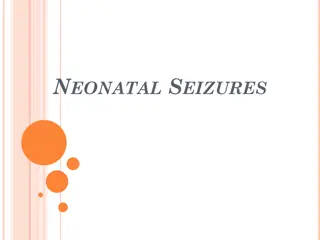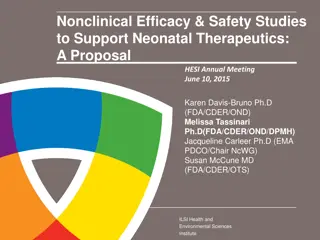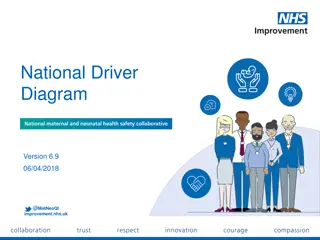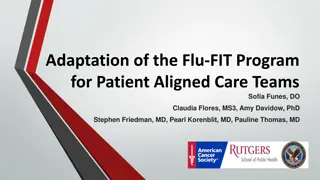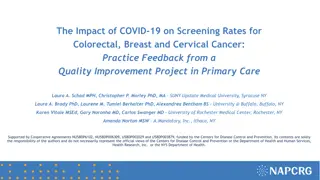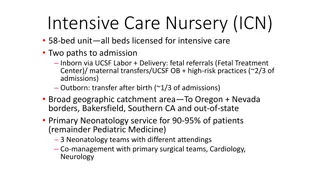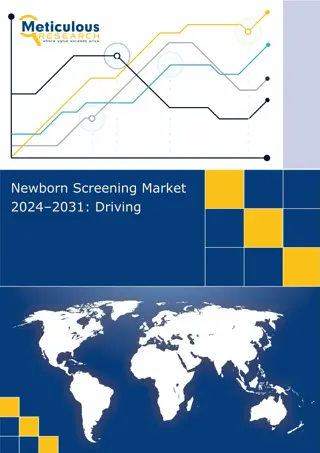Understanding Newborn Screening in Oklahoma
Newborn screening in Oklahoma is crucial for detecting hidden disorders in newborns that may not be apparent at birth. Early detection through screening can lead to timely treatment, ensuring healthy development and potentially saving lives. The process involves testing every newborn for harmful con
1 views • 88 slides
Understanding Neonatal Data Usage in the UK Healthcare System
Neonatal data plays a crucial role in assessing the quality of care provided to newborns in the UK. This resource from the National Neonatal Research Database at Imperial College London sheds light on how neonatal data is collected, utilized, and shared among healthcare professionals. The importance
1 views • 24 slides
Patient Screening and Workflow Process Optimization
The flowcharts and descriptions detail the steps involved in identifying eligible patients for screening, managing patient flow during visits, and tracking screening results. The process includes reviewing patient charts, determining screening eligibility, discussing screening options with patients,
2 views • 5 slides
Understanding Lung Cancer Screening Programs and Criteria
Screening for lung cancer is essential for early detection and intervention. CT scans have shown promise in reducing mortality rates, especially in high-risk populations. While challenges like cost and radiation risk exist, initiatives like the National Lung Screening Trial have demonstrated the eff
4 views • 28 slides
Screening for Malnutrition with MUST Tool
Understanding malnutrition is crucial for maintaining optimal health. Screening with the Malnutrition Universal Screening Tool (MUST) is essential to identify individuals at risk. This tool involves assessing BMI, calculating weight loss scores, and determining overall malnutrition risk. Proper scre
5 views • 25 slides
Ensuring Equality of Access to Cervical Screening: Key Considerations
Providing guidance on promoting equality of access to cervical screening, the importance of informed choice, information accompanying screening invitations, and checking for understanding to support individuals making informed decisions. Emphasizes the need for culturally sensitive approaches, espec
5 views • 21 slides
NEONATAL JAUNDICE
Neonatal jaundice, a common condition in newborns, results from elevated bilirubin levels. While often benign, high levels can lead to complications like kernicterus. Recognizing risk factors, limitations of clinical assessment, and appropriate evaluation and treatment are crucial in managing neonat
1 views • 48 slides
Neonatal Diseases
Neonatal and postnatal diseases in livestock, with a focus on perinatal, neonatal, and postnatal stages. It covers common classifications, causes, and risk factors associated with these diseases, particularly focusing on neonatal diarrhea (Calf Scour). The content delves into noninfectious and infec
0 views • 33 slides
Neonatal Data Collection and Utilization in Quality Care
Dive into the world of neonatal data with Catherine Nash, where the focus lies on the importance of collecting and utilizing data effectively to enhance care standards for babies and families. Discover how data systems like BadgerNet play a vital role in monitoring care, diagnosing treatments, measu
0 views • 7 slides
Understanding Sanction Regime Framework and Screening Controls
The presented content illustrates the sanction regime framework and screening controls, highlighting the significance of sanctions, who should be screened, and what should be included in the screening process. It covers the scope of sanctions, the importance of sanction screening, tools used for scr
3 views • 42 slides
Newborn Infant Physical Examination (NIPE) and Neonatal Checks Overview
Essential information on the NIPE screening update, neonatal checks, learning outcomes, eye examination, heart and CVS examination, and hips assessment for newborns. This content emphasizes early identification of abnormalities, top-to-toe examination, referral guidelines, and critical assessments t
0 views • 11 slides
Comprehensive Guide to Screening and Prevention in Family Medicine
This comprehensive guide explores the definitions, uses, and levels of screening and prevention in family medicine. It covers the criteria for screening tests, types of screening, examples of targeted populations, and approaches to preventing common problems in primary care. The content discusses th
0 views • 73 slides
Quality Improvement Toolkit for Improving Normothermia in Very Preterm Infants
This resource provides a comprehensive toolkit developed by the British Association of Perinatal Medicine in collaboration with the National Neonatal Audit Programme to assist clinicians in neonatal units in delivering normothermia to very preterm infants. It includes evidence-based interventions, d
1 views • 17 slides
Maternity and Neonatal Safety Improvement Programme Overview
The Maternity and Neonatal Safety Improvement Programme aims to enhance the quality and safety of maternity and neonatal units in England by reducing rates of maternal and neonatal deaths, stillbirths, and brain injuries. Through system-level project updates and regional collaborative efforts, the p
2 views • 70 slides
Neonatal Care at Lagos University Teaching Hospital (LUTH)
Lagos University Teaching Hospital (LUTH) is a tertiary referral center providing comprehensive neonatal care services. The facility has specialized units for inborn and outborn babies, offering advanced medical care, including neonatologists, resident doctors, nurses, and support staff. LUTH also h
0 views • 15 slides
Prostate Cancer Screening Guidelines in Canada: A Snapshot of Strategies
The Canadian Partnership Against Cancer annually collects and summarizes data on national, provincial, and territorial prostate cancer screening guidelines and strategies. Despite the absence of organized screening programs, some provinces have policies in place, with opportunistic screening by prim
0 views • 13 slides
Understanding Neonatal Jaundice: A Guide for Medical Students
This presentation by Dr. Khalid Altirkawi, M.D., Assistant Professor of Pediatrics, aims to educate medical students on neonatal jaundice. The content covers metabolic pathways of bilirubin, types of jaundice, diagnostic tests, prevention, and treatment strategies. It provides valuable insights into
0 views • 52 slides
Best Practices for Racial Equity Rapid Response Outreach
This document outlines suggested practices for a racial equity rapid response outreach program, focusing on a workflow for patient outreach, prioritizing patients based on specific criteria, and components of screening including wellness checks and screening for chronic medical conditions. The workf
0 views • 6 slides
Understanding Neonatal Seizures and Their Pathophysiology
Neonatal seizures are sudden changes in neurologic function of a newborn, involving motor, behavior, and autonomic functions. The pathophysiology includes delays in Na/K ATPase maturation, increased receptor density, and GABAergic transmission. Different types of seizures like subtle, clonic, tonic,
1 views • 24 slides
Importance of Vision Screening for Young Children
Understanding the critical development of vision in young children is crucial, as vision conditions can go undetected but have significant impacts. Early screening helps in identifying refractive errors, amblyopia, and strabismus for successful treatment. Prevalence statistics highlight the importan
0 views • 23 slides
Changes to Neonatal BCG Programme: Updated Timing and SCID Evaluation
The Neonatal BCG Programme has undergone changes, including shifting the timing of the BCG vaccine administration from birth to 28 days and introducing Severe Combined Immunodeficiency (SCID) evaluation. This session aims to educate on the modifications for safe practice. The BCG immunization progra
1 views • 12 slides
Understanding the Neonatal Period: Care and Evaluation
The neonatal period, also known as the newborn stage, encompasses the first 28 days of a baby’s life, characterized by rapid changes and fragility. This crucial stage requires specialized care, with sub-divisions such as the Period of the Partunate and Period of the Neonate. Commonly, neonates may
0 views • 19 slides
Insights on Improving Newborn Care with IMNCI in Lao PDR
Under-5 mortality rates are showing improvement, yet neonatal mortality lags behind. Addressing this requires a focus on neonatal care, particularly through the implementation of IMNCI protocols. The use of IMNCI can enhance the management of sick newborns, reduce neonatal deaths, and improve overal
0 views • 16 slides
Maternal and Neonatal Healthcare Insights
The data highlights key components, operational aspects, major causes, and timing of maternal and neonatal deaths. It emphasizes the critical period around delivery for both mothers and babies, stressing the need for interventions during this vulnerable time to reduce mortality rates. The informatio
0 views • 28 slides
Implementing Pulse Oximetry Screening for CCHD in Indiana
Indiana implemented pulse oximetry screening for Critical Congenital Heart Disease (CCHD) for all newborns as mandated by state law. The legislation, effective from January 1, 2012, requires every newborn in Indiana to receive CCHD screening, with exceptions only for religious beliefs. The state wor
0 views • 13 slides
Decision-to-Delivery Interval of Emergency Caesarean Sections and Maternal/Neonatal Outcomes at Thika Level 5 Hospital
Decision-to-Delivery Interval (DDI) study at Thika Level 5 Hospital examined 419 EMCS cases. The median DDI was 248 minutes, with 91.6% exceeding 75 minutes. Maternal complications were 6%, neonatal complications included MAS, RDS, birth asphyxia, and perinatal deaths. Prolonged DDI was associated w
0 views • 9 slides
Enhancing Transitional Care in Maternity and Neonatal Services at NHS Ayrshire and Arran
This project focused on reintroducing transitional care within the Maternity and Neonatal Service at NHS Ayrshire and Arran, aiming to enhance family satisfaction, reduce term admissions to the Neonatal Unit, and improve the overall care provided to families. Key strategies included changes in ward
0 views • 10 slides
Neonatal Admission Study: Understanding Risk Factors in Midwifery Settings
Neonatal Admission Study led by Dr. Rachel Rowe aims to investigate the admission of babies to neonatal care following birth in midwifery units. The study focuses on identifying risk factors and potential improvements in outcomes. The case-control study involves monthly data collection for 12 months
0 views • 10 slides
Understanding Neonatal Seizures and Differentiating from Jitteriness
Neonatal seizures are a critical sign of neurologic dysfunction in newborns, with various types such as subtle, clonic, tonic, spasms, and myoclonic seizures. The immature brain's excitability and differences from the mature brain predispose neonates to seizures. Generalized clonic seizures are rare
0 views • 17 slides
Enhancing Cervical Cancer Screening through NHS Cytology Programme
The NHS Cytology Screening Programme aims to reduce incidence and mortality from cervical cancer by offering systematic, efficient screening for pre-malignant diseases. With a history dating back to 1988, the programme targets women aged 25-64, emphasizing the importance of visualizing the cervix an
1 views • 38 slides
Join Trick-or-Treat for UNICEF to Eliminate Maternal and Neonatal Tetanus
Key Club and UNICEF are collaborating through Trick-or-Treat for UNICEF to help eradicate Maternal and Neonatal Tetanus (MNT). This initiative has raised over $175 million since 1950. Maternal/Neonatal Tetanus affects millions globally due to unsanitary birthing conditions. Learn how to get involved
0 views • 5 slides
Screening and Prevention in Family Practice
Definition of screening and prevention in family practice along with the Wilson-Jungner criteria, types of screening tests, and examples like colonoscopy and breast cancer screening. Objectives include understanding screening types and targeted populations, pros and cons of screening, and appropriat
0 views • 33 slides
Understanding Disease Screening and Prevention in Medicine
Explore the concepts of disease screening and prevention in preventive medicine. Learn about the importance of recognizing preclinical cases, the iceberg phenomenon of disease, and the role of medical intervention in arresting disease progression. Discover when to apply screening, the types of scree
0 views • 36 slides
Challenges in Supporting Neonatal Therapeutics: A Proposal Overview
Proposal presentation at HESI Annual Meeting discusses challenges in neonatal therapeutics, including off-label drug use in NICU, low clinical relevance in studies, and barriers to conducting neonatal trials. Mandates require inclusion of neonates in pediatric studies, but priorities and study desig
0 views • 22 slides
Overview of Cervical Cancer Screening Programs in Canada
The Canadian Partnership Against Cancer conducts an annual environmental scan on cervical cancer screening guidelines and strategies across the country. Organized screening programs are available in most provinces, offering services to asymptomatic women at average risk. This scan provides insights
1 views • 46 slides
Enhancing Maternal and Neonatal Healthcare Improvements
This initiative aims to improve the safety and outcomes of maternal and neonatal care in England by reducing unwarranted variations, providing high-quality healthcare experiences, and enhancing systems and processes for better care. Key focuses include promoting smoke-free pregnancies, optimizing ca
0 views • 7 slides
Implementation of Flu-FIT Program for Patient Aligned Care Teams at East Orange VA
This study details the adaptation of the Flu-FIT Program to enhance colorectal cancer screening rates within patient aligned care teams at the Veterans Affairs (VA) Department. By linking influenza immunization with colorectal cancer screening using fecal immunochemical testing, the project aimed to
0 views • 10 slides
Impact of COVID-19 on Cancer Screening Rates in Primary Care
This study examines the impact of the COVID-19 pandemic on colorectal, breast, and cervical cancer screening rates in safety-net primary care practices. A 7-year Quality Improvement Project aimed to increase screening rates through tailored education and practice facilitation. The project faced chal
0 views • 5 slides
Neonatal Research in Intensive Care Nursery
The Intensive Care Nursery (ICN) is a 58-bed unit that serves a diverse range of neonatal conditions and provides research opportunities at a Level IV NICU. The ICN facilitates study screening and recruitment with a focus on optimizing access to research for infants and families while limiting the b
0 views • 4 slides
A Lifesaving Start: Exploring the Rapid Growth of the Newborn Screening Market
The rising prevalence of congenital heart diseases and genetic disorders, the increasing neonatal population, and the rising awareness regarding newborn screening are the factors driving the growth of the newborn screening market. Additionally, emerg
0 views • 4 slides

